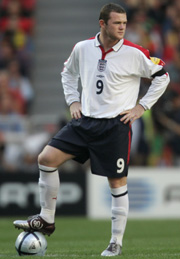 Wayne
Rooney may be hitting the back of the net on the field in Euro
2004, but he is also hammering it home when
it comes to domain name registrations.
Wayne
Rooney may be hitting the back of the net on the field in Euro
2004, but he is also hammering it home when
it comes to domain name registrations.
The young England star is on the verge
of stealing Michael Owen's second place on the domain name
chart, says web registration firm NetNames.
England's hero already has 10 domains in his name, one behind
Michael Owen. Even Sven Goran Eriksson has four. David Beckham
still heads the field though, with 111 registered domains.
It is not just because they are good footballers either, it is
because celebrities and sports stars
are increasingly becoming lucrative
"brands" in their own right, according to NetNames'
Jonathan Robinson.
Sites like Rooney Lookalike, which has been registered since
January 2004, is just a taster of what is being created off the
back of the striker's success.
"What's fascinating to me is that the minute a brand or
football star attracts attention, domain names just start 'happening',"
Mr Robinson told reporters. "The key thing is that the domain
name registration immediately picks up when the brand is news."
People tend to associate fame with money, which drives many speculative
web entrepreneurs to the net.
NetNames has ways of tracking the volume of domain names registered
on the net, using their own auditing software. Although this phenomenon
is not new, Mr Robinson warns that celebrities and their crews
of agents have to become more web savvy
when it comes to claiming a bit of the net for themselves quickly.
"It has been something that has been prevalent for a while,
but increasingly there is this concept of URLs and domain names
being used for specific product launches," he said.
The youth market in particular is very often the first to look
to the web to find information on a product or celebrities.
If they do not move quickly, they may have their name hijacked
by someone else who could cash in on the name.
"Many rising football stars have the potential to become
huge brands in their own right, so they need to start protecting
their online identities early on
in their careers," he said.
(Agencies)
